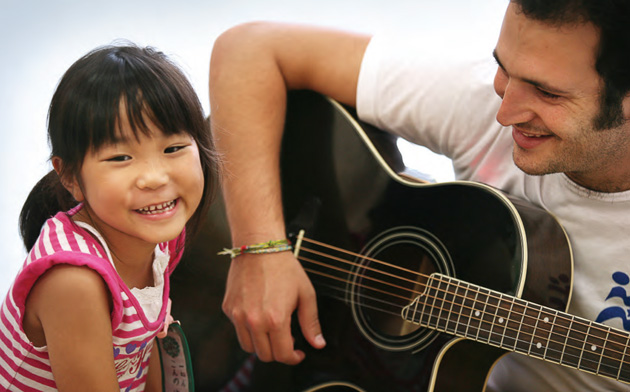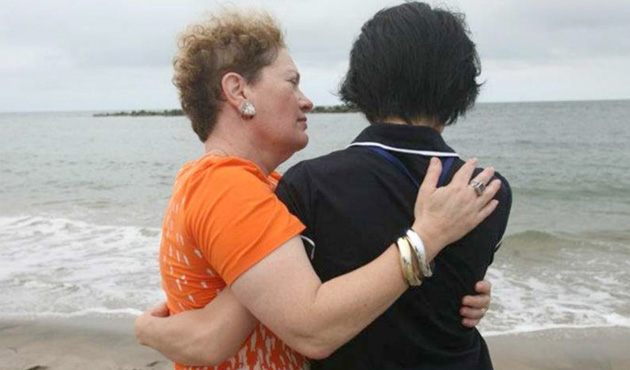IsraAID uses music, art and drama to prevent PTSD
After the largest earthquake in recorded history struck northern Japan one year ago there is still much to be done to rebuild the Tohoku region.
Countless volunteer groups, charities and NGOs have been working tirelessly to rebuild the earthquake struck regions. IsraAid is one such organization. Founded in 2001 by the Israel Forum for International Humanitarian Aid as a loose coalition of Israeli and Jewish NGOs, over the past few years the organization has grown in size and scope and now operates in such diverse locations as South Sudan, Haiti, Thailand and India.
Visiting Japan last year however, presented some unexpected challenges to the team.
“Our first team arrived four days after the tsunami, we sent Doctors in to do emergency relief,” explains Yotam Polizer, chief director of IsraAID in Japan. “We basically just went to the different disaster effected areas and distributed medicine and supplies.”
Polizer says that although the need for assistance was great, it was initially very difficult for the Japanese authorities to accept any kind of outside intervention or support. The Israeli NGO managed to develop close contacts with a number of shelters (for those who were homeless) and offered various post-traumatic relief activities for children, as well emergency relief and educational equipment and supplies to replace those that were destroyed and swept away by the tsunami.
“It was quite a challenge to bring medicine into Japan,” Polizer says. “As far as bureaucracy, we need approval from a Japanese hospital and we needed to bring a specific doctor from Israel who had to carry the boxes with him.”
During the emergency relief phase, IsraAID donated over three tons of food, medicine, and general relief items to help the immediate needs of the population. IsraAID team members also helped clean houses devastated by the tsunami.
When foreign aid began to arrive in Japan last March, many volunteers were faced with unexpected obstacles, Japan, unlike other disaster stuck countries is very advanced in terms of infrastructure but operates very differently to the rest of the world.
“When we started after three weeks going between places, most of the places refused our help in a very polite Japanese way. I don’t blame them, they saw a group of very strange looking foreign people and everything was so hectic back then.”
IsraAID specializes in post-trauma care using techniques developed in Israel. The decades of war, terror attacks, compulsory military service have led to a significant portion of the population being exposed to traumatic events. As a result, the emotional and mental needs of its citizens have led Israel to become a world leader in the identification as well as the management and treatment of post traumatic stress disorder (PTSD) and other trauma-related ailments.
In Japan, the effects of PTSD are already being seen. In the six months following the Earthquake, alcoholism, drug abuse, and other related problems among the tsunami survivors increased dramatically. At Aratame Hospital in Iwaki, a center that specializes in psychiatric care, the number of new patients increased by 20 percent.
In Fukushima Prefecture, suicides in May and June 2011 rose 20 percent compared to the same period in 2010.
While physical reconstruction is essential for communities to function, Polizer says mental health issues can often remain unseen– and therefore untreated. By using techniques that incorporate non-verbal communication such as art, music and drama, Japanese survivors have an opportunity to express themselves in completely a new way.
“The first big activity we did last year was in a town called Watari-cho, just south of Sendai, it was completely devastated by the tsunami,” Polizer says. “We conducted activities in a school where we got a huge piece of paper and split it into four… we then wrote the words, ‘tsunami, home, hope, happiness’ and encouraged the children to paint their feeling in each section.”
“First, they got black markers and erased the word ‘tsunami’ completely,” Polizer says. “In the ‘home’ section they painted their own home, washed away by the tsunami and in the ‘hope’ section they painted their town before the tragedy, in the ‘happy’ section they painted smiley faces – for us a very natural reaction.”
For the Japanese teachers, however, this came as a big surprise as this was the first time many of the children had expressed themselves or even mentioned the disaster.
“We were amazed at the reaction, some of the teachers started to cry, and they asked us to teach them how to work with the kids.”
“It’s important that we tell people that they are not ‘sick’, this is merely prevention and this helps Japanese people ‘click’ with the program.”
“In May we came back to Japan and conducted training for the teachers, we created a support group and we gave them tools to work with children, through art, drama, music and different relaxation techniques. Once this five day program was finished, those teachers became our biggest promoters, they said–‘This kind of program doesn’t exist in Japan’ and through them we were introduced to many other places.”
One year later, IsraAID works in eight cities with 25 different groups.
The organization was honored with the ‘Luminary Award’ by the Japanese Chamber of Commerce and Industry at the JCCI annual dinner in November last year and was featured in local Japanese newspapers. This exposure, Polizer says, has helped many Japanese people accept the group’s unorthodox methods.
“This is not Western psychotherapy we are bringing to Japan,” insists Polizer. “We are bringing non-verbal techniques, using art, movement and music, and this fits in with the Japanese culture as people don’t have to speak, they can paint, make origami or play music.”
“When we bring people in for training, people always bring notebooks as if they are expecting a lecture. We say ‘take the notebooks away and let’s start painting!’”
As March rolls on and the world once again focuses its attention on Japan, voluntary organizations like IsraAID are quietly doing there thing to help local people get back on track. In the cities of Natori, Iwanuma, Watari, Yamamoto, and Shinchi, IsraAID teams are planning to train an additional 700 teachers and mental health specialists, as part of its TT (Teacher Training) and TOT (Training of Trainers) project. In these cities, direct treatment activities will also be provided for an additional 1000 of those children who are most affected by PTSD.
“For the rest of 2012, we are hoping to create a very solid base in the places we are already active. We want to get to a point where the Japanese people we have trained are implementing what they have learned. There is still much to do,” says Polizer.
To learn more about IsraAID’s activities, please visit: http://israaid.co.il










